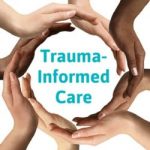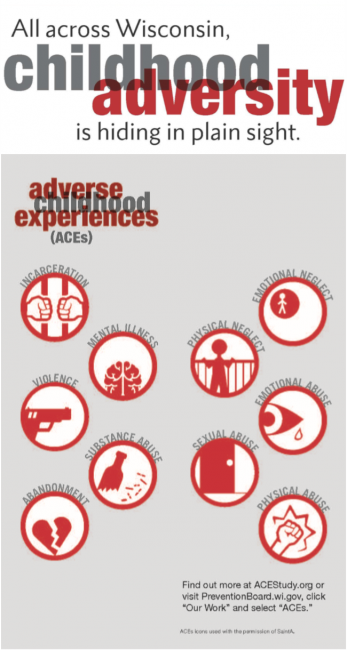
Trauma-Informed Care (TIC) is not something to be achieved or completed; it is the way we strive to do business. When we understand that individuals who have been exposed to trauma, stress or childhood adversity are responding in the way that feels safe for them, we are able to take a more compassionate approach to their experiences with us. TIC requires ongoing critical assessment of policies, staff, training, and hiring policies to create environments where individuals feel safe and empowered.
Why is Trauma-Informed Care important?
- Trauma-Informed Care is a universal precaution; trauma-informed practices provide healthier environments for everyone.
- Trauma-Informed Care promotes inclusiveness and builds better relationships with customers and staff.
- Trauma-Informed Care results in better outcomes.
- Trauma-Informed Care is grounded in science and is a response to the research on brain development and toxic stress.
Winnebago County Resources & Projects
Compassionate Care in Crisis: Tips for caring for others & ourselves
When we are under acute stress we are more likely to be operating from the survival areas of our brain, which means that our thinking becomes much more black and white, our attention is more narrowly focused on the immediate here and now, we start to have difficulty planning or thinking ahead, we have difficulty regulating our emotions, and we become less able to make decisions. Stressful times are associated with threats to our safety and a loss of power and control. A trauma informed approach can help reduce or prevent a trauma response. See all of our Compassionate Care in Crisis Tips here.

The Community Alliance for Trauma-Informed Care developed from a group of 12 organizations that began convening in 2016 as part of a POINT/Basic Needs Partnership action team, chaired by United Way Fox Cities. Since its inception, the Alliance has developed into a network that has brought transformation and growth to its founding members and to countless other organizations within the region. One of the resources created by this group is the Trauma Informed Roadmap.

To create the Trauma-Informed Roadmap, several local agencies assembled important principles, elements, and activities to becoming trauma-informed, based on a review of the current literature and existing models. The intent of the Roadmap is to give organizations interested and willing to start the important journey of becoming trauma-informed a compilation of resources and assessments to advance in those efforts.
DISCLAIMER: This is not a complete guide of how to become trauma-informed. The Roadmap represents our best effort at a compilation of existing practices and resources along with our ideas on how to become more trauma-informed. It is, by no means, exhaustive.
All materials developed through by the Trauma-Informed Roadmap Team are free of charge and can be used by any organization wishing to implement Trauma-Informed Care. Please visit the Community Alliance for Trauma-Informed Care (Northeast Wisconsin) website for more information, including downloadable resources.
Adverse Childhood Experience (ACE) Interface

The ACE Study confirms, with scientific evidence, that adversity during development increases the risk of physical, mental, and behavioral problems later in life. The ACE Study and other research using the Study’s framework have taught us that ACEs are common and are the leading cause of health and social problems in our nation – the most powerful determinant of the public’s health.
The prevalence of ACEs is staggering. There are 10 Adverse Childhood Experiences (ACEs), and the more ACEs an individual has, the higher their ACE Score and the greater their risk for long-term consequences. Nearly every community feels the medical and social burdens of subsequent behavioral and physical health problems, including depression, suicide, heart disease, diabetes, and early death.
There is hope for healing, however. Start by understanding ACEs and their effects with a FREE Wisconsin ACE Interface Training. The mission of ACE Interface is to promote awareness of ACEs throughout Wisconsin, to create a shift in perspective in how we view health and social issues, and to inspire a new approach to building healthy and resilient communities.
Our volunteer trainers teach schools, health systems, law enforcement agencies, and other community groups to identify and respond to the toxic stress of childhood adversity. The Wisconsin ACE Interface curriculum provides communities with an introduction to adverse childhood experiences (ACEs) and brain development. Trainers from nearly 30 Wisconsin child welfare, human service, and other agencies volunteer their time and resources to facilitate the first step in the creation of self-healing communities.
Contact Mandi Dornfeld, Extension Winnebago County, to schedule your training at (920) 232-1973.
- View the ACE Interface Overview flyer for more information.
- Understanding Adverse Childhood Experiences (ACEs), Building Self-Healing Communities
What the RESEARCH says:
- Helping Children Thrive: Early Childhood Development & ACEs
Provided by The National Institute for Health Care Management (NIHCM) Foundation, a nonprofit, nonpartisan organization dedicated to improving the health of all Americans by spurring workable and creative solutions to pressing health care problems.



